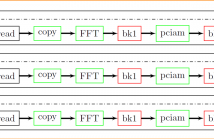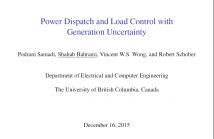
The IEEE Global Conference on Signal and Information Processing (GlobalSIP) is a flagship conference of the IEEE Signal Processing Society. GlobalSIP'15 will be held in Orlando, Florida, USA, December 14-16, 2015. The conference will focus on signal and information processing with an emphasis on up-and-coming signal processing themes. The conference will feature world-class speakers, tutorials, exhibits, and sessions consisting of poster or oral presentations. Outstanding papers will be selected for Best Paper Awards or Best Student Paper Awards; a paper is eligible for a best student paper award if the first author of the paper is a student. IEEE Signal Processing Society and National Science Foundation will provide travel grants to eligible students.

- Read more about A Comparative Study of Quality and Content-based Spatial Pooling Strategies in Image Quality Assessment
- Log in to post comments
- Categories:
 13 Views
13 Views- Read more about Optimal Scheduling of Networked Energy Storages
- Log in to post comments
Presentation.pdf
- Categories:
 14 Views
14 Views- Read more about A two-stage data-driven single microphone speech enhancement with cepstral analysis pre-processing
- Log in to post comments
- Categories:
 15 Views
15 Views
- Read more about Leveraging Sparsity into Massive MIMO Channel Estimation with the A-LASSO
- Log in to post comments
Recent channel measurement campaigns have revealed that at high carrier frequencies (10GHz and above) MIMO channels exhibit sparsity structure, i.e., a few dominant propagation paths and, in some cases, it can also reduce to a single path, yet very directive, wireless channel. In this work, we leverage the sparsity feature into the development of sparse-MIMO channel estimator and show, how an adaptive l1-optimization method can greatly improve the estimation error.
- Categories:
 40 Views
40 Views- Read more about Wireless Power Transfer for Distributed Estimation in Wireless Passive Sensor Networks
- Log in to post comments
This work examines the charging power allocation and beam selection problem for distributed estimation in wireless passive sensor networks, where the sensors are charged over the air by RF-enabled energy sources. A two-phase replenishment and transmission cycle is considered. In the replenishment phase, each wireless charger emits power over the air through a carefully selected beam and power to replenish the wireless sensors.
- Categories:
 17 Views
17 Views- Read more about Learning-Based Energy Management Policy with Battery Depth-of-Discharge Considerations
- Log in to post comments
This work proposes a learning-based energy management policy that takes into consideration the trade-off between the depth-of-discharge (DoD) and the lifetime of batteries. The impact of DoD on the energy management policy is often neglected in the past due to the inability to model its effect on the marginal cost per battery usage. In this work, a novel battery cost evaluation method that takes into consideration the DoD of each battery usage is proposed, and is utilized to devise the day-ahead energy management policy using reinforcement learning and linear value-function approximations.
- Categories:
 7 Views
7 Views- Read more about Effect of Noise Variance Estimation on Channel Quality Indicator in LTE Systems
- Log in to post comments
EffectNV.pdf
- Categories:
 9 Views
9 Views
- Read more about Head Tracking Using Video Analytics
- Log in to post comments
A robust, efficient video analytic tool is presented for detection and estimation of driver’s head position and orientation in the SHRP 2 NDS dataset. It is shown that by exploiting the temporal correlations between successive frames in a video, challenging conditions such as lighting variations, and lower resolutions, may be mitigated effectively. The Viola Jones frontal face detector provides initial results. Then, statistical inference methods for spurious faces elimination and missing driver’s head detection are developed.
- Categories:
 3 Views
3 Views
- Read more about A Hybrid Task Graph Scheduler for High Performance Image Processing Workflows
- Log in to post comments
The scalability of applications is a key requirement to improving performance in hybrid and cluster computing. Scheduling code to utilize parallelism is difficult, particularly when dealing with dependencies, memory management, data motion, and processor occupancy. The Hybrid Task Graph Scheduler (HTGS) increases programmer productivity to implement hybrid workflows that scale to multi-GPU systems.
- Categories:
 14 Views
14 Views
In this paper, we focus on the problem of joint load scheduling and generation management to better match supply and demand. We formulate an optimization problem to jointly minimize the generation cost and discomfort cost of the users subject to the voltage and power balance equations for the equivalent circuit of the power system. The optimal power flow (OPF) equations are solved using semidefinite programming (SDP) relaxation technique. In our system model, we assume that users can exploit renewable energy resources (RERs).
Present.pdf
- Categories:
 26 Views
26 Views